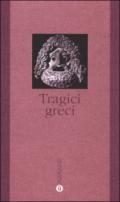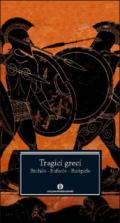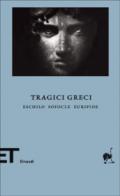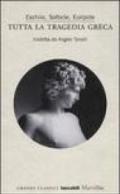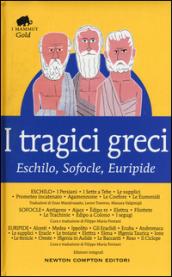
I tragici greci. Eschilo, Sofocle, Euripide. Ediz. integrale
Eschilo,
Sofocle,
Euripide
I tragici greci. Eschilo, Sofocle, Euripide. Ediz. integrale: Altissima espressione poetica, nonché specchio degli sviluppi politici della polis ateniese nell'epoca classica, la tragedia greca è giunta fino a noi attraverso i secoli mantenendo inalterato il fascino archetipico che ne costituisce l'impronta originaria. Nella rielaborazione drammatica del mito rivivono le convinzioni del singolo poeta ma anche l'eco delle discussioni e della vita civile e morale di un popolo. Così i personaggi di Eschilo non sono più semplici mortali in balia di forze cieche e oscure, ma uomini e donne coscienti e responsabili delle proprie scelte, vittime e colpevoli insieme (basti pensare a Clitennestra), spesso stupendamente delineati nella loro profondità emotiva. Sofocle rispecchia nelle sue opere l'ideale di sereno equilibrio che permeava la cultura greca in quegli anni. Eppure, nelle sue tragedie la lucida consapevolezza dell'infelicità umana, unita al sentimento della dignità insita in ogni sofferenza, e l'analisi razionale coesistono con la percezione di pulsioni insondabili cui soggiace il destino degli uomini (si pensi a Antigone o Elettra o Edipo). Profondo conoscitore dell'animo umano, Euripide ha creato indimenticabili figure tragiche, da Alcesti a Medea, a Oreste, scegliendo i suoi argomenti tra i miti meno noti e soffermandosi su aspetti secondari dei grandi cicli epici ed eroici. Le sue opere hanno influenzato attraverso i secoli il teatro di tutti i tempi: da quello romano a quello rinascimentale e barocco, dai romantici a D'Annunzio, fino a oggi. Highest poetic expression, and mirror political developments of the City-State in classical times, the Greek tragedy has come down to us through the ages while maintaining the original charm archetypal which constitutes its footprint. Dramatic reinterpretation of myth they relive the beliefs of the single poet but also the echo of discussions and civil life and morals of a people. So the characters of Aeschylus are no longer mere mortals at the mercy of blind forces and obscure, but men and women aware and responsible for their own choices, victims and perpetrators together (just think of Clytemnestra), often beautifully outlined in their emotional depth. Sophocles in his works reflects the ideal of peaceful balance that permeated Greek culture in those years. Yet, in his tragedies the lively sense of human unhappiness, combined with the feeling of the dignity inherent in every suffering, and rational analysis coexist with the perception of unfathomable instincts which underlies the fate of men (think Antigone or Elektra or ??dipo). Profound knowledge of the human soul, Euripides has created unforgettable tragic figures, from Alcestis in Medea, to Orestes, choosing her topics among the lesser-known myths and focusing on secondary aspects of the great epic and heroic cycles. His works have influenced over the centuries the theater of all time: from Roman times to the Renaissance and Baroque styles, from romantic to Gabriele D'Annunzio, until today.
Disponibile in 5 giorni lavorativi Ordina libro
Dettagli Libro
- Titolo: I tragici greci. Eschilo, Sofocle, Euripide. Ediz. integrale
- Autore: Eschilo, Sofocle, Euripide
- Curatore:
- Traduttore:
- Illustratore:
- Editore: Newton Compton
- Collana: Grandi tascabili economici. I mammut Gold
- Data di Pubblicazione: 2016
- Pagine: 1268
- Formato:
- ISBN: 9788854187832
- Viaggi - Letteratura di viaggio
Libri che ti potrebbero interessare

Tragici greci
Euripide, Eschilo, Sofocle
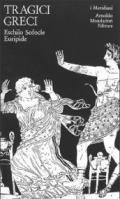
Tragici greci
Raffaella Cantarella, Eschilo, R. Cantarella, Euripide, Sofocle, Dario Del Corno

Drammi satireschi. Testo greco a fronte
Euripide, Sofocle, Giuseppe Zanetto, Eschilo, Orietta Pozzoli

I persiani-Elettra-Le troiane
Euripide, Sofocle, Eschilo

Il mito di Elettra
Eschilo, Sofocle, Euripide

I tragici greci. Eschilo, Sofocle, Eurip...
Eschilo, Sofocle, Euripide


